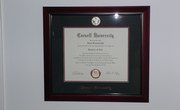Some students start college and find they lack the preparation, desire, discipline or ability to succeed academically or persevere until a degree has been earned. This leads to a dilemma -- whether to find the support needed to continue or to dropout. Understanding some of the common effects of quitting college may aid in the decision.
Wasted Investment
College is an investment. Students either pay for college themselves, possibly with family support or scholarships, or use financial aid. A February 2013 article in "The Wall Street Journal" indicated that many students drop out sometime during college because they can't or don't want to take on any more student loan debt. The consequence of dropping out at this point is that you have already piled up sizable debt and loan payments that you have to begin paying back several months after you quit school. Yet, you don't get the payoff of a degree.
Family Conflict
Some students attend college under pressure from parents or to make their parents happy. The decision to dropout in these cases is not always warmly received. In fact, some students are told that they can't return home after dropping out. The expectation is that they will get a job and enter the "real world." Dropping out may negatively affect relationships with significant others, as well. An April 2012 study by the "Council on Contemporary Families" revealed that divorce rates were significantly lower for college graduates than for those without college degrees.
Limited Career Options
According to a November 2012 article in "The Wall Street Journal," college dropouts face more limited career options than graduated peers. A bachelor's degree commonly opens the door to entry-level positions in many industries and career fields. As a dropout, your access to many jobs that require a college degree is limited. When applying, it is difficult to compete for jobs against people who hold degrees, even when a degree is not required.
Lower Earning Potential
In addition to any debt you must repay, your earning potential without a degree is much lower relative to degree holders, according to the "Wall Street Journal" article. Thus, many college dropouts struggle to cover short-term bills and expenses, and find it difficult even to consider saving up money for a home. According to 2012 US Bureau of Labor Statistics data, a college dropout earned about seven percent less than someone with an associate's degree, and about 32 percent less than someone with a bachelor's.
Related Articles
References
Writer Bio
Neil Kokemuller has been an active business, finance and education writer and content media website developer since 2007. He has been a college marketing professor since 2004. Kokemuller has additional professional experience in marketing, retail and small business. He holds a Master of Business Administration from Iowa State University.











